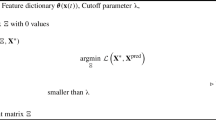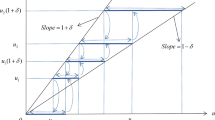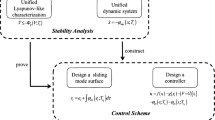Abstract
This paper investigates the problem of robust H-infinity state estimation for a class of uncertain discrete-time piecewise affine systems where state space instead of measurable output space partitions are assumed so that the filter implementation may not be synchronized with plant state trajectory transitions. Based on a piecewise quadratic Lyapunov function combined with S-procedure and some matrix inequality convexifying techniques, two different approaches are developed to the robust filtering design for the underlying piecewise affine systems. It is shown that the filter gains can be obtained by solving a set of linear matrix inequalities (LMIs). Finally, a simulation example is provided to illustrate the effectiveness of the proposed approaches.
Similar content being viewed by others
References
M. Johansson, A. Rantzer. Computation of piecewise Lyapunov quadratic functions for hybrid systems[J]. IEEE Transactions on Automatic Control, 1998, 43(4): 555–559.
A. Bemporad, G. Ferrari-Trecate, M. Morari. Observability and controllability of piecewise affine and hybrid systems[J]. IEEE Transactions on Automatic Control, 2000, 45(10): 1864–1876.
G. Feng. Stability analysis of piecewise discrete-time linear systems[J]. IEEE Transactions on Automatic Control, 2002, 47(7): 1108–1112.
G. Feng. Observer based output feedback controller design of piecewise-discrete time linear systems[J]. IEEE Transactions on Circuits and Systems-I: Fundamental Theory and Applications, 2003, 50(3): 448–451.
A. Hassibi, S. Boyd. Quadratic stabilization and control of piecewiselinear systems[C]//Proceedings of the 1998 American Control Conference. New York: IEEE, 1998: 3659–3664.
L. Rodrigues, S. Boyd. Piecewise-affine state feedback for piecewiseaffine slab systems using convex optimization[J]. Systems & Control Letters, 2005, 54(9): 835–853.
H. Lin, P. J. Antsaklis. Switching stabilizability for continuoustime uncertain switched linear systems[J]. IEEE Transactions on Automatic Control, 2007, 52(4): 633–646.
T. Tsubone, T. Saito. Stabilizing and destabilizing control for a piecewise-linear circuit[J]. IEEE Transactions on Circuits and Systems-I: Fundamental Theory and Applications, 1998, 45(2): 172–177.
T. Saito, K. Mitsubori. Control of chaos from a piecewise-linear hysteresis circuit[J]. IEEE Transactions on Circuits and Systems-I: Fundamental Theory and Applications, 1995, 41(3): 168–172.
M. Storace, O. De Feo. Piecewise-linear approximation of nonlinear dynamical systems[J]. IEEE Transactions on Circuits Systems-I: Regular Papers, 2004, 51(4): 830–842.
G. Ferrari-Trecate, D. Mignone, M. Morari. Moving horizon estimation for hybrid systems[J]. IEEE Transactions on Automatic Control, 2002, 47(10): 1663–1676.
R. Liu, Q. Zhang. Nonlinear filtering: a hybrid approximation scheme[J]. IEEE Transactions on Aerospace and Electronic Systems, 2001, 37(2): 470–480.
G. Feng. Robust filtering design of piecewise discrete time linear systems[J]. IEEE Transactions on Signal Processing, 2005, 53(2): 599–605.
B. Zhang, S. Xu. Robust filtering for uncertain discrete-time piecewise time-delay systems[J]. International Journal of Control, 2007, 80(4): 636–645.
J. Qiu, G. Feng, J. Yang. New results on robust H∞ filtering design for discrete-time piecewise linear delay systems[J]. International Journal of Control, 2009, 882(1): 183–194.
G. Feng. Non-synchronized state estimation of discrete time piecewise linear systems[J]. IEEE Transactions on Signal Processing, 2006, 54(1): 295–303.
J. Xu, L. Xie. Non-synchronized H∞ estimation of piecewise linear systems[C]//Proceedings of the 1st IEEE Conference on Industrial Electronics and Applications. New York: IEEE, 2006: 1–6.
J. Qiu, G. Feng, J. Yang. Delay-dependent non-synchronized robust H∞ state estimation for discrete-time piecewise linear delay systems[J]. International Journal of Adaptive Control and Signal Processing, 2009, 23(12): 1082–1096.
A. Lj. Juloski, W. P. M. H. Heemels, Y. Boers, et al. Two approaches to state estimation for a class of piecewise affine systems[C]//Proceedings of the 42nd IEEE Conference on Decision and Control. New York: IEEE, 2003: 143–148.
J. Xu, L. Xie, Y. C. Soh. H∞ and generalized H∞ estimation of continuous-time piecewise linear systems[C]//Proceedings of the 5th Asian Control Conference. New York: IEEE, 2004: 1240–1245.
J. Xu, L. Xie. H∞ estimation of discrete-time piecewise linear systems[C]//Proceedings of the 8th International Conference on Control, Automation, Robotics and Vision. New York: IEEE, 2004: 1163–1168.
L. Xie. Output feedback H∞ control of systems with parameter uncertainty[J]. International Journal of Control, 1996, 63(4): 741–750.
Author information
Authors and Affiliations
Corresponding author
Additional information
This work was partly supported by the Research Grants Council of the Hong Kong Special Administrative Region of China under the Project CityU/113708, partly by the National Natural Science Foundation of China (No.60825303, 60834003), partly by the 973 Project (No.2009CB320600), partly by the Postdoctoral Science Foundation of China (No.20100471059), and partly by the Overseas Talents Foundation of the Harbin Institute of Technology.
Jianbin QIU received his Bachelor’s degree in Mechanical and Electrical Engineering from the University of Science and Technology of China, Hefei, China, in 2004 and the Ph.D. degree in Mechatronic Engineering both from the University of Science and Technology of China, Hefei, China, and the City University of Hong Kong, Kowloon, Hong Kong, in 2009. He has been with Harbin Institute of Technology since 2009 where he is currently an associate professor. His current research interests include hybrid control systems, signal processing, and robotics.
Gang FENG received the B.E. and M.E. degrees in Automatic Control from Nanjing Aeronautical Institute, China, in 1982 and in 1984, respectively, and the Ph.D. degree in Electrical Engineering from the University of Melbourne, Australia, in 1992. He has been with the City University of Hong Kong since 2000, where he is a chair professor and the associate provost. He is a Changjiang chair professor at Nanjing University of Science and Technology, awarded by Ministry of Education, China. He was a lecturer/senior lecturer at School of Electrical Engineering, University of New South Wales, Australia, 1992-1999. He was awarded an Alexander von Humboldt fellowship in 1997-1998 and the IEEE Transactions on Fuzzy Systems Outstanding Paper Award in 2007. His current research interests include piecewise linear systems, modeling and control of energy systems, and intelligent systems & control.
Professor Feng is an IEEE Fellow, an associate editor of IEEE Transactions on Automatic Control, IEEE Transactions on Fuzzy Systems, and Mechatronics, and was an associate editor of IEEE Transactions on Systems, Man & Cybernetics, Part C, Journal of Control Theory and Applications, and the Conference Editorial Board of IEEE Control System Society.
Huijun GAO was born in Heilongjiang, China, in 1976. He received the Ph.D. degree in Control Science and Engineering from Harbin Institute of Technology, Harbin, China, in 2005. From November 2003 to August 2004, he was a research associate in the Department of Mechanical Engineering, University of Hong Kong, Hong Kong. In November 2004, he joined Harbin Institute of Technology, where he is currently a professor. From October 2005 to October 2007, he was a postdoctoral researcher in the Department of Electrical and Computer Engineering, University of Alberta, Canada. His current research interests include network-based control, robust control, and time-delay systems and their industrial applications.
Professor Gao is an associate editor of the IEEE Transactions on Industrial Electronics, IEEE Transactions on Systems, Man and Cybernetics Part B: Cybernetics, IEEE Transactions on Fuzzy Systems, Journal of Intelligent and Robotic Systems, etc. He was an outstanding reviewer for the IEEE Transactions on Automatic Control and Automatica in 2008 and 2007, respectively, and an appreciated reviewer for the IEEE Transactions on Signal Processing in 2006. He was the recipient of the University of Alberta Dorothy J. Killam Memorial Postdoctoral Fellow Prize in 2005, the National Outstanding Youth Science Fund in 2008, and the National Outstanding Doctoral Thesis Award in 2007. He was the corecipient of the National Natural Science Award of China in 2008.
Rights and permissions
About this article
Cite this article
Qiu, J., Feng, G. & Gao, H. Nonsynchronized state estimation of uncertain discrete-time piecewise affine systems. J. Control Theory Appl. 8, 286–292 (2010). https://doi.org/10.1007/s11768-010-0025-8
Received:
Published:
Issue Date:
DOI: https://doi.org/10.1007/s11768-010-0025-8




